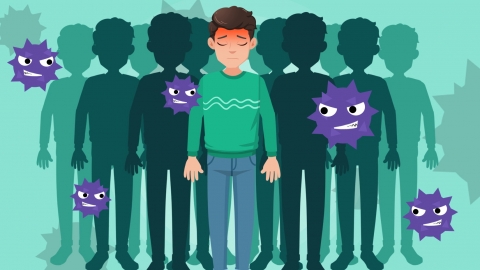Why am I experiencing a fever again five days after the fever subsided from influenza B?
Influenza B usually refers to Influenza B. Generally speaking, the main reasons for fever recurring five days after the fever subsides in Influenza B include further decline in immunity, incomplete clearance of the virus, secondary bacterial infection, complications, and reinfection. If discomfort symptoms occur, it is recommended to seek timely treatment at a regular hospital. Detailed analysis is as follows:
1. Further decline in immunity
During the recovery period of influenza, the body has not fully recovered. If excessive fatigue, chilling, or insufficient nutrient intake occurs, immunity may decline again, allowing residual viruses or newly invading pathogens to cause fever. It is important to ensure sufficient sleep, avoid staying up late, and consume more protein-rich foods like eggs and milk to enhance the body's resistance.
2. Virus not completely cleared
If the Influenza B virus in the body isn't completely eliminated, it may replicate extensively again when the body's resistance weakens, causing an inflammatory response and resulting in fever. Under a doctor's guidance, continue using antiviral medications such as Oseltamivir capsules, Peramivir sodium chloride injection, or Zanamivir inhalation powder to inhibit viral replication.

3. Secondary bacterial infection
The respiratory mucosa may be damaged during influenza, making it susceptible to secondary bacterial infections such as bacterial pneumonia or acute bronchitis. Bacterial infections can cause persistent fever. Under a doctor's guidance, antibiotics such as Azithromycin dispersible tablets, Cefaclor capsules, or Amoxicillin capsules can be used to control the infection.
4. Development of complications
Influenza B may lead to complications such as myocarditis or otitis media, which can cause fever recurrence, often accompanied by discomfort symptoms in the corresponding areas. Timely medical examination is necessary to identify the type of complication and provide targeted treatment. For example, myocarditis patients need bed rest and should take medications like Coenzyme Q10 tablets as directed by a physician to nourish the heart muscles.
5. Reinfection
After recovery, short-term contact with other Influenza B patients or exposure to variant viral strains may lead to reinfection, causing fever again. Avoid going to crowded places, wear a mask properly when going out, wash hands and disinfect promptly after returning home to reduce the risk of infection.
In daily life, ensure regular indoor ventilation to maintain air circulation; adjust clothing promptly according to temperature changes to avoid getting chilled; avoid strenuous exercise during the recovery period from influenza and gradually resume normal activity levels; if fever persists or is accompanied by other severe symptoms, seek immediate medical attention.






